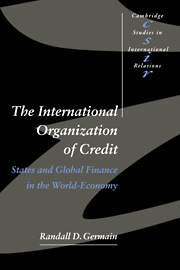Book contents
- Frontmatter
- Contents
- List of figures and tables
- Preface
- Note on figures and tables
- Glossary
- 1 Routes to international political economy: accounting for international monetary order
- Part 1 The international organization of credit in historical perspective
- Part 2 The contemporary international organization of credit
- 4 The era of decentralized globalization
- 5 Decentralized globalization and the exercise of public authority
- 6 Finance, power, and the world-economy approach: towards an historical–institutional international political economy
- Appendix: Top merchant/investment banks, by city and era
- References
- Index
- CAMBRIDGE STUDIES IN INTERNATIONAL RELATIONS
6 - Finance, power, and the world-economy approach: towards an historical–institutional international political economy
Published online by Cambridge University Press: 14 January 2010
- Frontmatter
- Contents
- List of figures and tables
- Preface
- Note on figures and tables
- Glossary
- 1 Routes to international political economy: accounting for international monetary order
- Part 1 The international organization of credit in historical perspective
- Part 2 The contemporary international organization of credit
- 4 The era of decentralized globalization
- 5 Decentralized globalization and the exercise of public authority
- 6 Finance, power, and the world-economy approach: towards an historical–institutional international political economy
- Appendix: Top merchant/investment banks, by city and era
- References
- Index
- CAMBRIDGE STUDIES IN INTERNATIONAL RELATIONS
Summary
This chapter draws together the arguments of part 2 to explore the changing nature of power in the contemporary international organization of credit. In particular, it considers the implications which the shift towards market authority carries for the way in which finance is organized, and how it functions. The insights provided by the world-economy approach suggest that the international organization of credit will be unstable into the early years of the twenty-first century because of the changing balance of power within finance and the world-economy more broadly considered. With the sources of power now more diffuse than at any time in the twentieth century, the possibility of fashioning effective international leadership in financial matters remains highly circumscribed, although not impossible. The chapter then stands back to reflect upon the world-economy approach and the disciplinary future of IPE. It closes by arguing the case for what I call an historical–institutional future for IPE based upon the advantages offered by the ontology of the world-economy approach.
The changing nature of power in the international organization of credit
The balance of power between state and market authority has been transformed since the 1970s. States today are less involved in the creation and allocation of credit in terms of both the actual movement of funds across borders and the regulation of capital movements. They are also less involved in the determination of exchange rates, and have fewer resources at their disposal to influence these rates compared to either the volume of foreign exchange transactions or the asset base of internationally active banks.
- Type
- Chapter
- Information
- The International Organization of CreditStates and Global Finance in the World-Economy, pp. 162 - 178Publisher: Cambridge University PressPrint publication year: 1997

